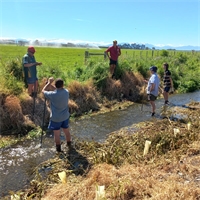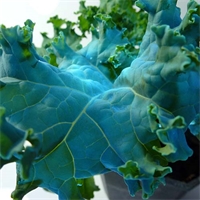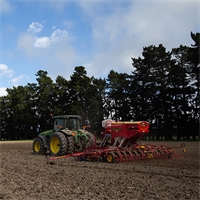29Dec
Corteva™ Agriscience has farmers covered
THIS PROMOTIONAL FEATURE WAS PROVIDED BY CORTEVA
Brassica Weeds
Weed competition can have a significant detrimental effect on brassica yield from very early in the growing season. Corteva™ Agriscience has farmers covered with a suite of post emergence forage brassica herbicides that provide a solution for all situations, and two new label extensions are poised to make life even easier for those growing forage brassica this season, including raphanobrassica.
The first new claim is for Milestone™ herbicide, which in addition to existing forage brassica claims is now also registered for broad spectrum weed control in raphanobrassica. Milestone is the ultimate solution for hard to control weeds in forage brassica crops and its broad-spectrum control includes difficult weeds such as amaranthus, spurrey, water pepper, thistles and many more. Up until now Radiate herbicide has been the go-to product for weed control in raphanobrassica and while its good for fathen and nightshade, Milestone significantly broadens the weed spectrum. Milestone can be used at 500ml-750ml/ha in raphanobrassica without any impact on crop safety.
The second new claim is for Korvetto™ tank mixed with T-MAX™, which is now registered for control of Amaranthus (redroot) in all forage brassicas except raphanobrassica. Tall, and fast growing, Amaranthus can form large, aggressive plants and seriously compete with crops if it is not well-controlled.
Adding 500 mL/ha of T-MAX to 1 L/ha of Korvetto provides market leading control of Amaranthus in forage brassica when compared to existing market standards.
Uptake spraying oil is required when using Milestone herbicide and the Korvetto + T-MAX tank mix for amaranthus control. Uptake is a thoroughly researched and highly trusted brand and contains a proprietary blend of ingredients that allows it to it perform reliably across a range of spraying conditions. Not all oils are created equal so it’s important to select Uptake when using these products to guarantee the best performance from the products.
Brassica Pests
When pests like diamondback moth, white butterfly, looper caterpillars or aphids threaten forage brassica crops, time is critical. Caterpillar pests can do significant damage to leaf area within a short space of time resulting in reduced yield potential. Aphids transmit plant viruses, and their feeding points provide entry wounds for diseases which can severely damage plants or even kill large areas of forage brassica crops.
Ideally your first line of defence at this time of the season will be a population of beneficial insects, providing natural protection against white butterfly, diamondback moth caterpillars and aphids. Species such as brown lacewing, ladybird beetles, hoverfly, parasitic wasps, predatory mites, and beetles will collectively play an important role in protecting your brassica crop from pest flare ups and damage through until grazing. Monitor your crop closely for both pests and beneficial insects and if caterpillar and/or aphid populations do flare up and require treatment use insecticides with minimal impact on beneficial insects such as Sparta™ and Transform™ from Corteva agriscience.
Sparta works by contact and ingestion to provide ‘best in class’ control of caterpillar pests in forage brassicas. Translaminar activity ensures good control of insects feeding on the underside of leaves. Transform is a contact and systemic insecticide that provides rapid knockdown and moves within the plant to protect new untreated growth, an important benefit during the main growth season. Transform’s high level of systemic and translaminar activity resists wash-off and provides extended aphid control for up to 21 days. This residual control provides ongoing protection from aphids re-infesting the crop.
Alone or in combination Sparta and Transform are ideal tools for control of key insect pests in forage brassicas. Both products have excellent environmental and toxicology profiles, providing a high level of safety for applicators.
New Zealand farmers rely heavily on aerial applications for effective pest control, whether it’s hill country or remote crops, and scenarios where wet ground conditions or tall crops cannot be covered by ground-based equipment. In these situations, Transform and Sparta are two of only a few IPM friendly options registered for aerial applications, providing farmers and applicators an opportunity to move away from old SP & OP technology, to new chemistry that’s better for the crop, the environment and them.
Related

Placing catchment communities in the Ashburton District at the centre of decisions and direction on ...
Read More

Staying local and true to its original intent is Ruralco’s primary focus for its future strategy.
Read More

Transform a glass jar into a chic statement piece with this easy DIY yarn-wrapping technique.
Read More

Forage brassicas are a great source of home-grown feed at times when pasture is not enough.
Read More

Cereal plantings have continued through the winter and preparation for early pasture renewal is unde...
Read More

Australia’s vast scale often means many New Zealanders carry a simplified, condensed version of it ...
Read More